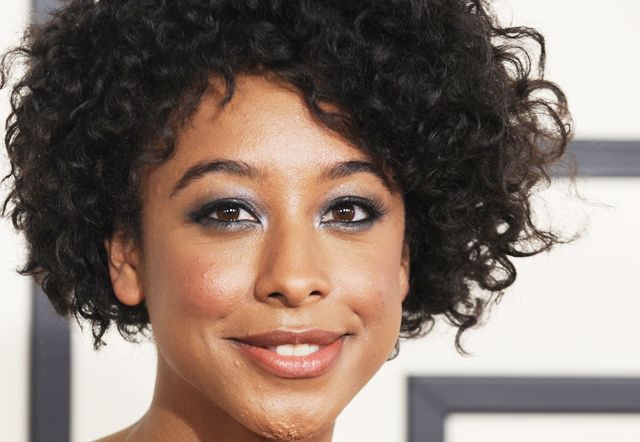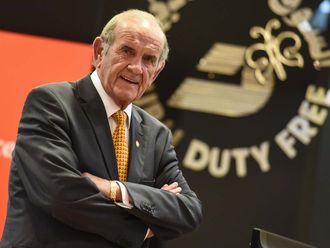In the summer of 2007, Corinne Bailey Rae headlined the Jazz World stage at the Glastonbury festival. It was a fitting finale to a whirlwind 18 months spent promoting her eponymous debut album. Released in February 2006, it became one of the pop soundtracks of the summer, reaching No 1 in Britain, gatecrashing the US charts at No 4, and selling nearly four million worldwide.
"I just ran off the stage and leapt in the air," she says of Glastonbury. "It was like, ‘Yes! I've finished!' I'd had offers to do shows in Australia and Brazil, but I just wanted to draw a line on that record with the Glastonbury gig and move on."
Corinne went home to her house in Leeds and began writing songs, just her and her acoustic guitar. One of the first she finished was called The Sea, a powerful elucidation of loss that was based on a family story that had been passed down to her about her grandfather's death in a boating accident. It climaxes with the lines, "The sea, the majestic sea, breaks everything, cleans everything, crushed everything, takes everything from me."
She says now, "I don't know if there was something in the air or what, but the songs seemed different, a bit darker. With The Sea, I was just thinking about loss, about the impact losing your father would have on you as a child, how one event that big could colour your life, bleed into everything else and force you into a certain shape."
Another song she wrote around that time was called I'd Do it All Again. It was written after an argument with her husband, Jason Rae, a gifted jazz musician who often played saxophone in her band.
"It was written literally just after me and Jason had this massive disagreement, a big argument, a bad one," she says now, faltering. "Almost as he was leaving the room, I just sat down and wrote it. It's just about how I felt about him at that time. Even right in the middle of the worst times, I remember thinking that I would choose this exact life again, that I would do it all again. I'm 100 per cent committed to this person. I don't have any regrets about this relationship even though there are all these difficult times."
I'd Do it All Again begins: "Oh, you're searching for something I know won't make you happy/Oh, you're thirsting for something I know won't make you happy". It sounds now like a plea, a calling-out to someone to accept the life they have been given. "I just wanted him to be content," she says.
Life changing
She wrote I'd Do it All Again in January 2008, and "just kept on writing and trying out ideas". Then, on Saturday 22 March, she was in a taxi in Leeds when her phone rang. A voice she did not recognise said that it was the police, that they had been trying to contact her all day, and that they needed to speak to her in person.
"Life changes fast," writes Joan Didion in the opening lines of her extraordinary memoir of loss and grief, The Year of Magical Thinking. Life changes in an instant. And this how it was for Corinne Bailey Rae when, on the side of a road on the outskirts of Leeds on an otherwise ordinary day, a female police officer told her that Jason had been found dead in a flat in the city.
"The police asked me to meet them at a certain place so the taxi had to do a U-turn and go back the way we came," she says now. "I always think of that moment when I had to turn back. My life was going in one direction, then, in an instant, it was turned around."
The coroner's report found that Jason Rae, aged 31, had died of an accidental overdose of methadone and alcohol. The coroner described Rae as "a naive user", which brought a strange kind of comfort to the young widow who was struggling to make sense of a death that seemed so random, so senseless.
"The word ‘naive' jumped out at me," she says. "It's like Jase was playing with something he didn't know the consequences of. "
Restarted career
It's at the end of August, 2009, that I travel up to Manchester to meet Corinne in a small studio in the suburbs where she has tentatively re-started her recording career. In the front room of a detached house, and run by two local jazz musicians-cum-producers, John Ellis and Steve Brown, Limefield Studios is an intimate setting, cosy and overcrowded with equipment. "Most of it was done in this room in a circle," she says. "It's almost like we're playing live and there's a small audience. On the first album, it was me and a producer in a basement going though hundreds of snare drum sounds to find the right one. With a live band, you can stretch out more and try new things."
She leads me into what looks like a garden shed but is actually a booth for recording vocals. I listen, rapt, to a song called Closer, a slice of '70s-style soul-funk with shades of Curtis Mayfield. What is immediately apparent is that Corinne's voice has changed, deepened and become a more expressive. She sounds older, more confident and, at times, more beautifully world-weary.
Defiant
In the living room, she picks her way through guitars and amplifiers, and sits down at a piano in the corner with Steve Brown. As he plays a slow meditative melody, she sings I'd Do it All Again. It is breathtaking; sombre but defiant, and imbued with a whole other layer of meaning and longing since Jason's death.
"A year ago I could not have imagined going out and playing these songs live," she says afterwards, "but now I'm looking forward to it. I want to play live as much as possible."
Corinne had grown up in Leeds, the eldest of three daughters of an English mother and a Caribbean father, who separated when she was a child. At school, she studied classical piano for a time. Her mother, she says, "found religion when I was about 10, and I started singing in church". There, she was taught by youth leader Simon Hall, a maverick who encouraged the singing of Primal Scream songs, albeit rewritten, at worship alongside hymns. He also encouraged her to play guitar and write songs of her own.
"He introduced me to Led Zeppelin and Radiohead."
At 15, in thrall to hardcore feminist rockers such as L7, Rae formed an all-female rock group, Helen. But they soon disbanded. By then, Corinne had met her manager, Bob Miller, a local businessman who kept insisting she should strike out on her own.
It was at Bob Miller's insistence, though, that she travelled to London in 2003 to sign a solo publishing deal and then record an album funded by a production company, Good Groove, run by Gary Davies, the former Radio 1 DJ. "Every record company had turned her down, bizarrely," he told Q magazine in 2007. "I would have remortgaged my house if I needed to; anything to get her heard."
The rest, as they say, is pop history. EMI bought that finished album, and, after the extraordinary success of her debut single Like a Star and its follow-up, the feelgood soul-pop anthem Put Your Records On, Corinne Bailey Rae became, alongside Amy Winehouse, the pop voice of 2006.
"I remember going to Mary J Blige's party at the Grammys with Jason, really showbiz, really bling," she says, laughing. "We didn't know a single person there and then we saw this older guy beckoning us over to these stairs which led up to a roped-off area where all the stars were. It was Quincy Jones. He was really friendly. Jason and him just hit it off."
Sadness
I ask if her success had complicated their relationship. She thinks for a moment. "No, except for the times we spent apart. That was hard and there was a sadness to it, the sadness of going away to America, or wherever, without him. Sometimes we had a horn section on tour and he came along if he didn't have his own commitments, and sometimes we didn't." She pauses for a moment. "In a way, there wasn't a lot for a musician like him to do. He wanted more. And, besides, he didn't want to get noticed through me. No way."
At the time of his death, Jason was also playing in Mark Ronson's touring band. "He was an incredible dude," Ronson later wrote on his MySpace page, "a lovely gentleman, ... and one of the most amazing sax players I've ever had the pleasure of playing with."
Corinne descended into the kind of raw, bottomless grief that Joan Didion describes so unflinchingly in her memoir.
For a long time, she continued to refer to her late husband in the present tense, seemingly unable to grasp that he was gone for ever. About three months after his death, she tried to record some of the songs she had written, even turning up at a studio to meet a producer. "I felt like everything would somehow go back to normal if I got on with things but, in reality, I was still in shock."
Then came the strange inertia that grief instils in those left behind. "I sat at my kitchen table for a whole year, people came and people went, life drifted by. It was just bleak. Bleak."
Did she think that she might give up music altogether? "I did think that I could never do this sort of thing again because if anyone asked me about Jason, I would just explode. It was just too destructive to make anything creative out of."
Earlier this year, though, Corinne began tentatively recording again. She had started writing after playing a few low-key club gigs at the end of last year. The intimacy of that set-up had led her to Limefield Studios, where she has worked at her own pace for months now.
A few weeks after my studio visit, I go to Leeds to hear more almost finished songs from the as yet untitled work in progress that will become the second album. The Sea is a powerful, almost anthemic song that sounds unlike anything she has done before. Again, as you hear its repeated refrain "goodbye paradise" it is hard to believe it was written before Jason's death.
Most poignant of all, though, are a pair of songs written in the wake of her loss: the plaintive Are You Here? and the slow-burning I Would Like to Call it Beauty. The first is a love song, or, more precisely, a lost-love song. It begins, "He's a real live wire, he's the best of his kind, wait till you see those eyes!" When I ask her about it, she says, "I actually don't remember writing it. That was one of the songs that just came through. It was like I was wishing him here."
It would seem that the effortless pop performer has, for the time being at least, gone. Anyone expecting the same kind of well-wrought, if hardly challenging, pop songs that made her debut such a big seller is in for quite a surprise. I'd hazard a guess that EMI are, too. In her place is a singer of immeasurably sad songs, someone who has transmuted her well of grief and anger into something beautiful and raw. "I definitely feel more serious," she says. "I feel more impassioned. I have total belief in these songs and when I sing them in front of people, I want to pass that on. I don't think there is anyone of my generation saying these things, singing about these things. And it happens, you know. It can happen to anyone at any time. I want to be out there on stage with my hands out going, does anyone else feel the same way? That's what it's about, too."
Beauty of loss and hope
Corinne Rae Bailey's lost -love song Would Like to Call it Beauty begins with the line: "Too young for death, we walk in shoes too big."Is it a song written for and to her late husband and about finding beauty even in the darkest times? "Yeah, in a way it is. You find out there's a lot of beauty and grace even in the darkness. In the way people treat you, in nature, in the things you maybe took for granted. There is something miraculous that pushes you along, makes you keep going, makes you carry on. It's really about the mystery of that. In fact, the whole album is about that in a way; it's about loss but it's also about hope, about keeping going and trying to find that beauty."
How Corinne met jason
Jason Rae and Corinne Bailey were married in 2001, when she was just 22. He was a Scot living in Leeds and immersed in the city's jazz and soul scene. They had met when he came into a small jazz club in Leeds where she was a cloakroom attendant and started chatting her up. "He had that charismatic thing that you're kind of excited by and wary of," she says, smiling. "He was just so confident and funny, the life and soul of the party, a storyteller and a great musician."Soon afterwards, at his insistence, she went to see his band, the Haggis Horns, supporting soul giant Maceo Parker. "I walked in while he was doing a solo and I was really blown away. He came out and gave me a Red Stripe, and that was it." "He was so knowledgable and generous," she says. "I suppose he was a bit of a jazz snob, but he was passionate about it. He had a huge record collection — hip-hop, soul, funk, jazz — all this extraordinary music that I suddenly had a way in to."
Did you know?
- In 2006 Corinne Bailey Rae won best newcomer and best UK female at the Mobo Awards as well as best new act at both the Mojo and Q Awards. She also received three nominations at the Brits and another three at the Grammys.












